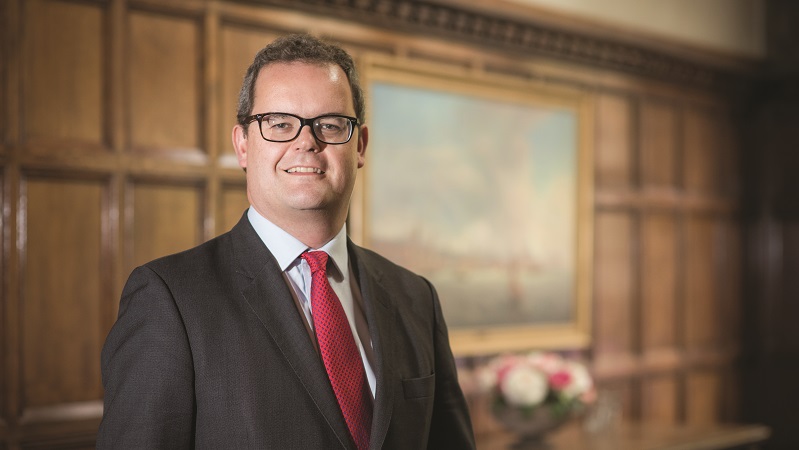What a difference a year makes. In August, Felix Wintle, manager of the VT Tyndall North American fund, was positioning the portfolio to benefit from the spending of millennials on things such as going to concerts and watching American wrestling to drive his fund’s performance.
Flash forward to today and the portfolio has done a 180-degree turn, with the theme now very much being to try to take advantage of the sweeping changes Covid-19 has made to everyone’s working and social lives.
The result? Gone are the manager’s long-term holdings in his previous top 10 companies such as Disney, WWE and the gig company Live Nation. In their place, among others, come in Zoom Video Communications, the online revision company Chegg and Teladoc Health, a telemedicine and virtual healthcare company, as Wintle sets about positioning the fund for the new world we are living in today.
On launching the fund, three years ago this month, the former manager of the Neptune US Opportunities Fund between 2005 and 2016, wanted non-correlated exposure to the US index. With all that has happened since the turn of 2020, he says now is the time for active funds to truly shine in the US.
“No-one can really predict where the world is heading,” he says. “There has been a stark change in the way we work, live, communicate and socialise, which has happened almost overnight. It is this huge change we are seeking to take advantage of and it presents a huge opportunity to re-shape the portfolio for where the world is going to, not where it has been.”
As a result, portfolio turnover has been significantly higher since the turn of the year than at any point in the fund’s first three years, up 50% on the same quarter last year. The manager says the crisis has forced him to go through the portfolio with “a sharp knife” and remove those stocks that will struggle to survive in today’s new environment.
“While we have a defined process, we are always open-minded as to how and why things can change. Something we hold dear is that we are not wedded to one particular mindset,” he says. “There is always the risk of falling in love with certain stocks, so one thing this crisis has forced me to improve upon is to be colder about selling them when the time arises.”
Selling companies that rely on crowds of people turning up
Wintle splits the portfolio into two distinct buckets, one half is invested in core long-term holdings and the other is held in more tactical short-term ideas. While much of the recent turnover has been in the more tactical side of the fund, he says the events of this year have forced him into selling core long-term holdings as well.
One of the highest profile names to go is Disney. Despite the successful launch of its streaming service Disney+, Wintle noted the effect on the media giant’s share price due to the closure of its theme parks and the suspension of all sports.
“We love the Disney business longer-term, but it has real short-term problems,” he says. “It is getting hit from all sides, with 50% of its revenue coming from the theme parks which have been closed, while no sport being on TV is a huge problem for ESPN, which Disney also owns. So while the Disney+ numbers have been phenomenal so far, it is not enough to keep the share price rising, so we have decided to sit on the sidelines for the time being.”
A theme across the fund today is the selling of those companies that depend on people turning up or crowds coalescing for their revenue. So gone are LiveNation and the budget gym operator Planet Fitness, as the manager concedes it is impossible to predict when people will return to seeing live music or going back to the gym.
At the same time, the portfolio’s weighting to consumer discretionary stocks has also been slashed. “The consumption part of the economy is difficult to get your head around right now,” Wintle says.
“We normally have a mid-teens weighting in this sector, but that has now been cut back to just over 5%, which is held in only two stocks, Amazon and Chegg. We are seeing many companies go bust, such as the car rental company Hertz and the mall operator JC Penney, as Covid-19 has created a whole list of areas you want to avoid in the short and medium term.”
Zoom, Teladoc and Chegg all added to portfolio
Instead Wintle is now looking towards those sectors and stocks that are not only benefitting from the current situation, but will be made stronger by them. The most high profile example of this is Zoom.
“Video conference calling software has been around for over 30 years, but until recently no-one has really used it,” he says. “Yet in the space of just three months Zoom’s subscribers jumped from 10 million at the end of December, to 200 million at the end of March, which is the type of growth that would typically take at least five years, if ever.”
As a result, in March the manager initiated a tactical position, which became a top-10 holding that month with a 4% weighting. With doctors’ offices closed across the US, he also added a position in Teladoc, an online doctor surgery, while he increased his weighting in Chegg, which he says since the crisis has stepped more into the distance learning space.
“There are many companies which we believe will be made stronger by this crisis,” he says. “Sector wise it means we have added some technology to the portfolio, increasing our overall weighting to about 27%. However, unlike many of our peers who have large weightings in the Faang stocks, our additions have mostly been in mid-cap names.”
Indeed, Wintle has no Faang names in his top holdings, with the only large-cap name in the top 10 being Microsoft. “The Faangs are the story of the last decade, now is the time to look for the small- and mid-cap names which will be the mega caps of tomorrow,” he says.
A fund for today and tomorrow
As an active manager of US equities, the one question Wintle fields more than any other, is why should an investor bother going active over passive? With this in mind, he points to the recent reports that the top five stocks in the S&P 500 now represent some 20% of the overall index, as a reason to be wary of index investing.
“I am creating a fund for today and tomorrow, not the past which is what you get with passive, he says. “If you own an ETF or a tracker fund you will be getting lots of exposure to large parts of the market that are underperforming such as financials, energy and consumer names.
“Instead, the time is now to be selective as to what your weightings are, and it should really bring about an end of the dominance of passives. Why would you want general exposure when specific exposure is what is required?”
An argument also against active investing in the US has often been that the market is so efficient, it is impossible to beat the index over a sustained period of time, but Wintle thinks this has changed in the wake of the chaos created by the coronavirus.
“The uncertainty has led many companies to withdraw their earnings guidance for the rest of the year, which makes price discovery and valuations much harder and more subjective than it has ever been. The US market has definitely become less efficient.
“What is amazing is that despite all of this, the market for now is being so well behaved, my thesis is to stick with companies where you can see certainty and can get your head around the investment case, rather than invest in those companies that may not make it.”
Not much will happen face-to-face for the rest of 2020
So how is Wintle coping with the lockdown and the challenges that come from working from home?
“One of the challenges is to make sure you keep your day organised or you could just spend your whole time listening to a deluge of video calls,” he says. “Just because all that research is there, it doesn’t mean you have to consume it all.
“However, I don’t think the management of the portfolio has suffered at all from working from home. Luckily we operate in an industry that lends itself well to staying at home, but I do miss the office banter.”
Like many active managers, Wintle places great importance on meeting management. When operating a US fund out of the UK, this would often mean the accumulation of many air miles, so does he think the fund will suffer from the lockdown and lack of personal contact?
“I don’t think much will happen face-to-face for the rest of 2020, and possibly into next year. But this is a line in the sand that says we will not go back to how things were,” he says.
“While I find meeting companies helpful and there is always a benefit to meeting people, on most occasions it doesn’t give you a huge steer. Unearthing golden nuggets from meeting people face-to-face is uncommon, so while I would always rather meet companies, I don’t think its absence will be hugely detrimental.”
Fund hits three years this month
Wintle’s fund is not the only one celebrating its anniversary, July marks three years since the launch of Tyndall Investment Management, and the manager says the firm’s small size and independence is a huge advantage to him.
“We are focused on one thing, investment,” he says. “Many of the bigger companies are distracted and held back by the wider issues confronting the industry, which is leading to lots of M&A. None of this M&A is done with clients in mind, it’s done to try and prop up the corporate entity so they can better compete on price, while giving a commodity-like service.”
Wintle began his career in 1999 at City Financial Asset Management, where he became manager of the CF Biotech Fund in 2003. In 2004, the firm was acquired by Neptune IM and a year later he was handed the keys to his first US equity fund when he took over management of the Neptune US Opportunities Fund in August 2005.
“Following the dotcom crash and the global financial crisis, it seems unbelievable to have a third major crisis in a career,” he says. “While we always look for historical analogies, each one has been different. The difference this time has been the huge response by the Fed, but in terms of severity it ranks highly.
“The challenge is working out which areas of the US are working well and which are not, that for me is a huge call to arms for active managers and investors to rethink their passive exposure as it is going to create many winners and losers.”
So has the fund performed during the current crisis? Year-to-date it is up 5.9% versus a 0.92% fall from the S&P 500, in sterling terms, which he says has largely been aided by his overweight in healthcare. He adds a focus on new leadership has helped him outperform, rather than depending on the mega-cap tech companies that are so widely owned today.










